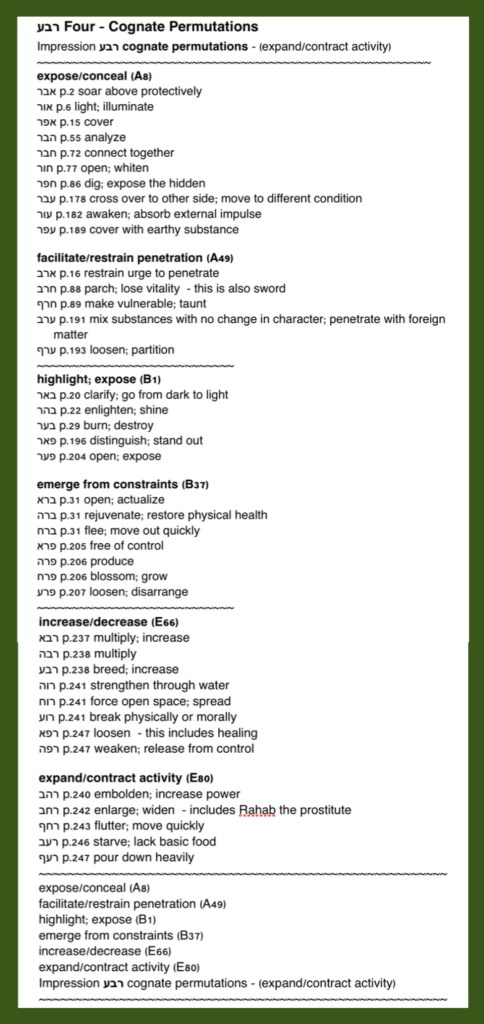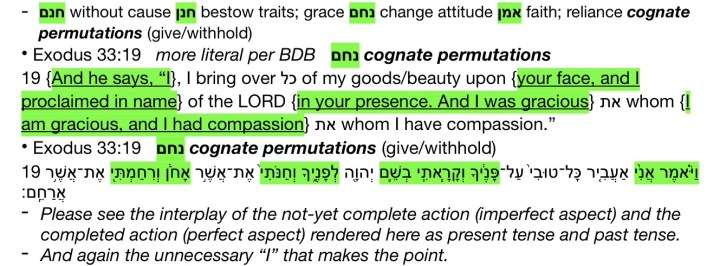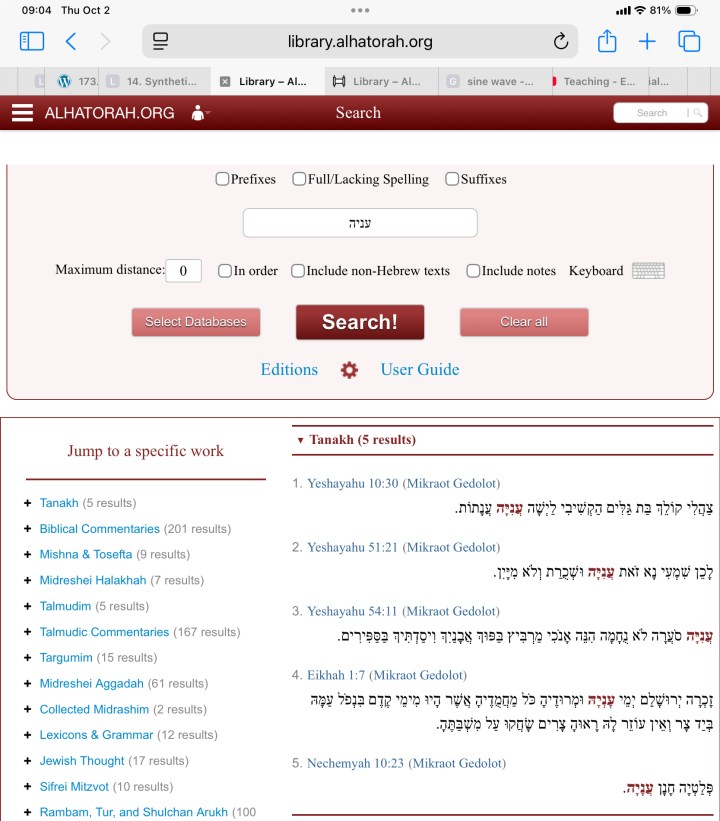A clear point at which he made a choice:

See the בחר choose/choice cognate permutation group meaning is (expand/contract activity), and it is in with other very important roots such as עברcross over to the other side (the root for Hebrew), רבע four/fourth, אור illuminate/light, חרב sword/lose vitality, עפר dust, and אפר ash. (As in ash to ash, dust to dust). See the list of roots below in the green box outline.



The biggest choice we can make in life is to turn around and go in a different direction (repentance). This is what, in essence, Yeshua/Jesus tells us to do in the Log and Speck teaching. We stop and we turn from our present way of seeing things.
⦁ Matthew 7:3-4
3 Why do you see the speck that is in your brother’s eye, but do not notice the log that is in your own eye? 4 Or how can you say to your brother, ‘Let me take the speck out of your eye,’ when there is the log in your own eye?
I pray that you allow the LORD to guide the hundreds of choices you must make every day. He does not force himself upon you, but is very available if we allow him.
- ⦁ Luke 12:35-36
- 35 “Let your waist be girded and your lamps burning; 36 and you yourselves be like men who wait for their master, when he will return from the wedding, that when he comes and knocks they may open to him immediately.
Turning in a different direction can be physical, but can also be an internal process. Looking at “changing attitude,” נחם, which is one of the choices that only we can make.
⦁ Numbers 23:19
19 God is not man, that he should lie,
or a son of man, that he should change his mind. יתנחם from נחם
Has he said, and will he not do it?
Or has he spoken, and will he not fulfill it?

⦁ Exodus 33:19
19 Then He said, “I will make all My goodness pass before you, and I will proclaim the name of the LORD before you. I will be gracious to whom I will be gracious, and I will have compassion on whom I will have compassion.”

Impression חנם without cause חנן bestow traits; grace נחם change attitude אמן faith; reliance cognate permutations (give/withhold) (direct resource [positive/negative])
- Remember the thirteen attributes of the LORD.
⦁ Exodus 34:6-7
6 And the LORD passed before him and proclaimed, “The LORD, the LORD God, merciful and gracious, longsuffering, and abounding in goodness and truth, 7 keeping mercy for thousands, forgiving iniquity and transgression and sin, by no means clearing the guilty, visiting the iniquity of the fathers upon the children and the children’s children to the third and the fourth generation.”

- It is hard to miss here the LORD’s generous spirit, and that he acts in the arena of giving and withholding. Our own choices can make a difference in how he deals with us, just as our children’s choices affect how we deal with them (explanation to follow’.
⦁ 1 Samuel 15:29
29 And also the Glory of Israel will not lie or have regret, for he is not a man, that he should have regret.”

- English translations of this word נחם can sometimes be somewhat confusing (or at least were so for me).
“son of man” בן אדם from Numbers 23:19 above…

The first use is Numbers 23:19. Perhaps Yeshua/Jesus was telling those listening that he is the one who has compassion (another suggestion he used this method in his teaching), but all the Scribes and Pharisees could hear was the claim to be God as inDaniel 8:17, referring to end times. (The generations of mankind have had the impression that they must be living at the end times, that things in their time are so very terrible. But indeed, the cycles are but repeating.) This is a perfect example of how we get one central focus in our minds, and then everything in our lives orbits around that focus. They focused SO strongly on the idea of breaking a rule, a “command,” that they became hypervigilant in that arena, even to the point of killing one that was obviously (to others) somehow in close connection with the LORD. (Read John 3:2 and John 9:17 & 30-32) When we focus so hard on one tree, we are unable to see the forest. When, as a medical professional (and I include myself here) we become so subspecialized that we cannot see the person as a whole, that becomes the problem rather than the answer. We must always fall back on our primary care or our naturopath to look at the bigger picture). My good friend the gerontologist explained that his first focus in seeing a new patient would be to get them off of many medications, often prescribed by assorted specialists who looked at their own “tree.”
Never mind that Ezekiel uses this combination בן אדם (son of man) 93 times in his book, Isaiah twice, and Jeremiah four times (also Psalms three times and Job three times). All the Scribes and Pharisees saw was Daniel 8:17.
There is a lesson here. What is that Log in your eye that you are SO focused upon that you cannot see around it? There are so very many issues that can become our addiction. If we are convinced there will be false messiahs coming, we are on the lookout. If we are convinced we are in the End Times, all around us we see signs of the End Times (even though Yeshua/Jesus told us this would be so) [[Matthew 24:6; Mark 13:7; Luke 21:9]]
See the Matthew 15 passage in the initial screenshot. Yeshua/Jesus was convinced of his mission: Matthew 15:24 “I was not sent except to the lost sheep of the house of Israel,” that he could easily have ignored the faith אמונה (from root אמן) of this woman. Read the context –
⦁ Matthew 15:22-23
22 And behold, a woman of Canaan came from that region and cried out to Him, saying, “Have mercy on me, O Lord, Son of David! My daughter is severely demon-possessed.”
23 But He answered her not a word.
And His disciples came and urged Him, saying, “Send her away, for she cries out after us.”
- He had even taught his apostles (sent-out ones) previously, and they thought they were faithfully following his direction –
⦁ Matthew 10:5-6 (NKJV – Sending Out the Twelve; Mark 6:7–13; Luke 9:1–6)
5 These twelve Jesus sent out and commanded them, saying: “Do not go into the way of the Gentiles, and do not enter a city of the Samaritans. 6 But go rather to the lost sheep of the house of Israel.
- But ••• and this is a big “but” ••• two things he recognized, one being her faith אמן which awakens that נחם change of attitude. And he sees her humility – he calls her people “little dogs” (dog is a very derogatory term in Scripture), and she is not defensive, she accepts that “blow,” turns the other cheek and says: (I see this as a big turning point because it is a physical demonstration to the disciples, from which they learn – actions speak louder than words.)
⦁ Matthew 15:27
27 ••• “Yes, Lord, yet even the little dogs eat the crumbs which fall from their masters’ table.”
- This is a sign of humility when we accept the blow from the other, not defensively, but in faith.

Righteous indignation (as seen in the Scribes and Pharisees) doesn’t get very far with God. Humility plus faith can indeed change his attitude. This is the Hebrew root from which “humility” is formed.

We pause for one brief moment for a Hebrew lesson just to help you see how easy it is for you to see what Scripture is saying in some circumstances. This is a very brief excerpt from Benner:

See that one common way of forming a noun from a verb is to add a Vav ו inside the root. Here we see that the noun “humility” ענוה is formed by adding the Vav ו within the root ענה. Remember that Vav ו is a labial and can be interchanged with Bet ב, which we recently were reminded is formed as an abbreviated prefix from ביתmeaning house. Think of it as someone having humility ענוה as being in the house of “being humbled” or “being humble” ענה. ((not to drift too far… Benner also notes adding a Yod י internally in the root. The Yod י is a palatal and thus similar in meaning to כ. EDBH indicates the prefix כ is a shortened form of the root כון. The root כון p.116means to prepare, and on p.299, EDBH indicates “The כ highlights an example for all to emulate.” It is most commonly translated as “like” or “as,” and in my literal translations from BDB I most always use “like,” but it is good to keep in mind this idea of “an example to emulate.” If we used this same root ענה and add a Yod י within, we see:))

⦁ ▸ Tanakh (5 results)
1. Yeshayahu 10:30 (Mikraot Gedolot)
צַהֲלִי קוֹלֵךְ בַּת גַּלִּים הַקְשִׁיבִי לַיְשָׁה עֲנִיָּה עֲנָתוֹת.
⦁ Isaiah 10:30
30 Lift up your voice,
O daughter of Gallim!
Cause it to be heard as far as Laish—
O poor Anathoth!
2. Yeshayahu 51:21 (Mikraot Gedolot)
לָכֵן שִׁמְעִי נָא זֹאת עֲנִיָּה וּשְׁכֻרַת וְלֹא מִיָּיִן.
⦁ Isaiah 51:21
21 Therefore please hear this, you afflicted,
And drunk but not with wine.
3. Yeshayahu 54:11 (Mikraot Gedolot)
עֲנִיָּה סֹעֲרָה לֹא נֻחָמָה הִנֵּה אָנֹכִי מַרְבִּיץ בַּפּוּךְ אֲבָנַיִךְ וִיסַדְתִּיךְ בַּסַּפִּירִים.
⦁ Isaiah 54:11
11 “O you afflicted one,
Tossed with tempest, (and) not comforted,
Behold, I will lay your stones with colorful gems,
And lay your foundations with sapphires.
4. Eikhah 1:7 (Mikraot Gedolot)
זָכְרָה יְרוּשָׁלַ͏ִם יְמֵי עׇנְיָהּ וּמְרוּדֶיהָ כֹּל מַחֲמֻדֶיהָ אֲשֶׁר הָיוּ מִימֵי קֶדֶם בִּנְפֹל עַמָּהּ בְּיַד צָר וְאֵין עוֹזֵר לָהּ רָאוּהָ צָרִים שָׂחֲקוּ עַל מִשְׁבַּתֶּהָ.
⦁ Lamentations 1:7
7 In the days of her affliction and roaming,
Jerusalem remembers all her pleasant things
That she had in the days of old.
When her people fell into the hand of the enemy,
With no one to help her,
The adversaries saw her
And mocked at her downfall.
5. Nechemyah 10:23 (Mikraot Gedolot)
פְּלַטְיָה חָנָן עֲנָיָה.
⦁ Nehemiah 10:22
22 Pelatiah, Hanan, Anaiah,
(Again, the names have meanings…)
Enough for the side trail… but, remember, we are speaking of being in a house that is humbled, as in poor or afflicted.
Impression ענוה humility cognate permutations (presence/absence of painful experience)
- Recall a repeated plea from Moses:
⦁ Deuteronomy 5:15
15 And remember that you were a slave in the land of Egypt, and the LORD your God brought you out from there by a mighty hand and by an outstretched arm; therefore the LORD your God commanded you to keep the Sabbath day.
⦁ Deuteronomy 6:21
21 then you shall say to your son: ‘We were slaves of Pharaoh in Egypt, and the LORD brought us out of Egypt with a mighty hand;
⦁ Deuteronomy 15:15
15 You shall remember that you were a slave in the land of Egypt, and the LORD your God redeemed you; therefore I command you this thing today.
⦁ Deuteronomy 24:18
18 But you shall remember that you were a slave in Egypt, and the LORD your God redeemed you from there; therefore I command you to do this thing.
- Above, Moses reminds Israel repeatedly not to forget the presence of that painful experience of slavery, in order to preserve their humility.
- The theme is carried forward by Paul into the Greek Scripture (see screenshot). And Yeshua/Jesus’s actions with the woman “caught in the very act of adultery,” and the response of the would-be stoners in John 8 is a testament to their recognition of their own sinfulness/addiction. He introduces the first “Twelve-Step Program.” 😉 ((Another example is Matthew 9:27-28.))

The big point is that faith/faithfulness, plus humility, opens the door for compassion, from the LORD and also from other people. Going back to Matthew 7:1-2, if we desire compassion in our own life, we should be showing compassion to others. This is the “choice” that Yeshua/Jesus makes, and his choice teaches us how better to choose.
(Later, after Yeshua/Jesus had gone to be with the Father, the apostles did acts of healing because he showed them how to recognize this quality of humility plus faith. See, for example Acts 5:14-15 and Acts 19:11-12 [[read the context following this one]] Other similar in Acts 3:1-10 and Acts 14:8-10.
The lame, the blind, the leper, the sinner, the slave are in a state of humility, though the sinner only when he/she recognizes they are a sinner. Those people can look intently(Acts14:9) and demonstrate faith. But for the “rich,” those blessed in abundance, “How hard it is”(Luke18:24). Choices make all the difference. Choose a humble state, but because in the U.S. we have SO MUCH abundance, “How hard it is.”
Blessings, PG
Ⓒ Copyright Philip E. Gates; LogAndSpeck.com October 2025